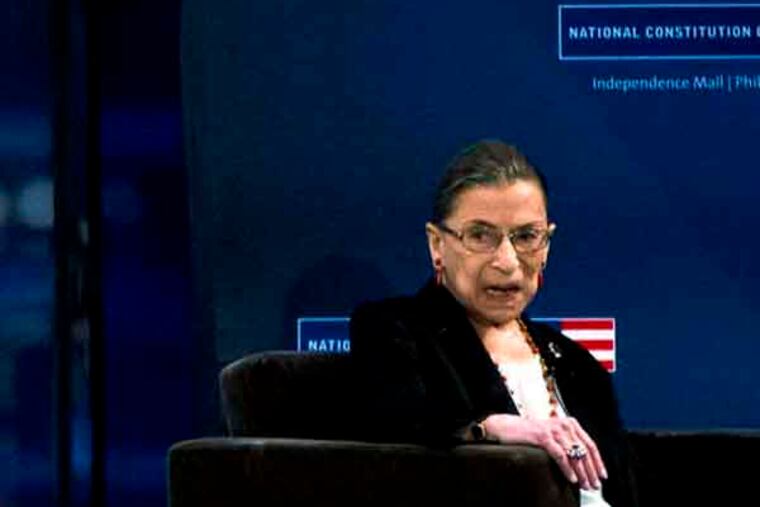Ruth Bader Ginsburg speaks at Constitution Center
Supreme Court Justice Ruth Bader Ginsburg, in a 90-minute talk Friday evening at the National Constitution Center, gave a vigorous defense of activist government that provides for the basic health care and economic well-being of its citizens.

Supreme Court Justice Ruth Bader Ginsburg, in a 90-minute talk Friday evening at the National Constitution Center, gave a vigorous defense of activist government that provides for the basic health care and economic well-being of its citizens.
Ginsburg, leader of the court's liberal wing, spoke at length about the ideological tenor of the court, her views on the court's recent decision to strike down a key section of the Voting Rights Act, and her long-standing friendship with Justice Antonin G. Scalia, the acknowledged standard-bearer for the court's conservatives.
The sellout crowd of more than 800 periodically applauded and laughed at Ginsburg's remarks. Ginsburg, 80, appeared to become more energetic as the evening progressed.
Ginsburg, sometimes sounding more like a social scientist than a jurist, said the issue of whether Congress has the constitutional right to provide for the social and economic well-being of U.S. citizens was settled in the 1930s with the enactment of Social Security.
The United States was merely falling in line with policies of other developed nations, she said.
That line of policy development and legal reasoning, she said, justified the Affordable Care Act, which she voted to uphold when she joined Chief Justice John G. Roberts Jr.'s majority opinion.
"Most countries in the world have universal health care," she said. "Government has an obligation to see that people's basic needs are met."
Ginsburg's remarks came during an interview with Jeffrey Rosen, the Constitution Center's president and chief executive. Rosen served as a law clerk with the U.S. Court of Appeals for the District of Columbia Circuit earlier in his career, while Ginsburg was a judge there. They struck up a friendship that has lasted.
Ginsburg, clearly frustrated by the court's decision on the Voting Rights Act, declared that under Roberts' leadership it had become the one of the most activist courts in U.S. history.
"It is a court that is not at all hesitant to overturn legislation passed by Congress," she said.
Ginsburg explained that in seeking to lead the liberal wing, which comprises four of the court's nine votes, she regularly confers with colleagues to fashion dissents that reflect their views.
When Rosen asked her whether the court, which is widely viewed by the public as ideologically driven, was motivated by politics, she said it had never been the case that jurists would trade votes on one case for assistance on another.
"There is no horse trading: You vote for me today, I will vote for you tomorrow," Ginsburg said. "That never happens."
Because of her age, Ginsburg has lately been the target of criticism by some liberals who say she should step down to give Obama the opportunity to appoint a younger jurist in the event that Democrats lose the White House in 2016.
Ginsburg, who has recovered from two bouts with cancer, has said she has no intention of stepping down while she is still healthy.